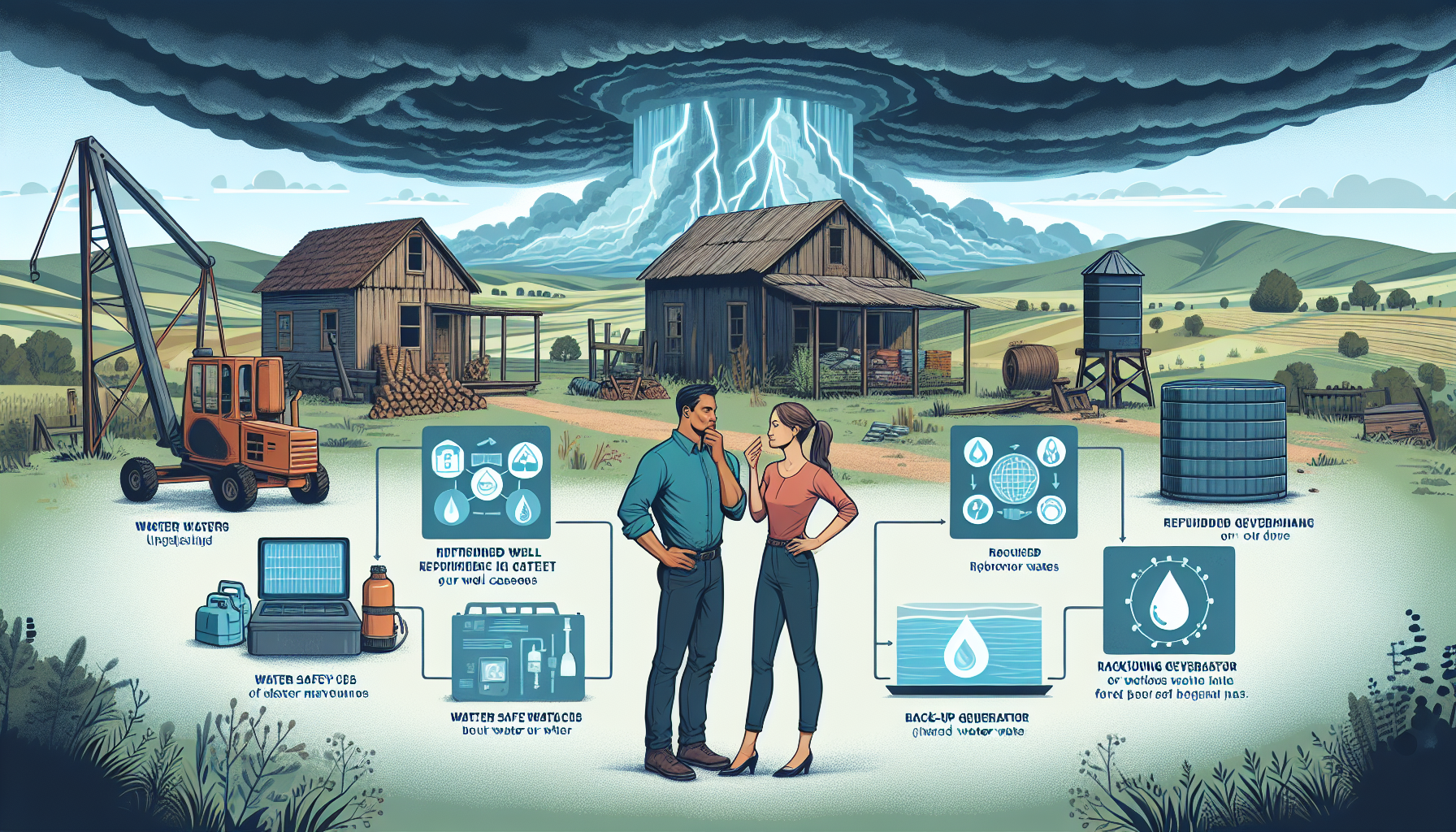Are you a well owner worried about the resilience of your well water during disasters? Look no further, because there are resources available to help you address this concern. From information on well maintenance and emergency preparedness, to guidance on water testing and filtration options, these resources aim to empower well owners like you with the knowledge and tools to ensure the safety and reliability of your well water, even in times of crisis. So, if you’re eager to learn more about safeguarding your well water resilience, read on for valuable insights and practical advice.

Understanding Well Water Resilience
Defining Well Water Resilience
Well water resilience refers to the ability of well systems to withstand and recover from the impact of disasters, such as hurricanes, floods, and earthquakes, while maintaining safe and reliable water supply. It involves the preparation, testing, treatment, and maintenance of wells to ensure their functionality and water quality during challenging times.
Importance of Well Water Resilience during Disasters
Well water resilience is crucial during disasters as it ensures access to safe and sufficient water for a variety of essential needs. When traditional water sources are compromised or unavailable, well owners can rely on their wells for drinking, cooking, hygiene, and agricultural purposes. By being prepared and following resilience strategies, well owners can minimize the impact of disasters on their water supply and the overall well system.
Common Challenges Well Owners Face during Disasters
During disasters, well owners face various challenges that can significantly impact their access to clean water. These challenges include power outages, damage to well equipment, contamination of well water sources, and limited access to professional assistance due to overwhelmed emergency services. Understanding these challenges is crucial to developing effective strategies for well water resilience.
Well Water Testing and Treatment
Testing Well Water Quality
Regular testing of well water quality is essential to ensure its safety and to identify any potential contaminants. Testing should be carried out by certified laboratories and should cover parameters such as bacteria, nitrates, pH levels, heavy metals, and other harmful substances. By regularly monitoring water quality, well owners can take appropriate actions to address any issues and maintain the resilience of their well water.
Importance of Regular Water Testing
Regular water testing is vital because it allows well owners to detect any changes in water quality that may occur during or after a disaster. It helps identify potential sources of contamination, assess the effectiveness of treatment measures, and ensure that the water is safe for consumption. By conducting periodic water tests, well owners can stay proactive in maintaining the resilience of their well water.
Common Contaminants in Well Water
Well water can be susceptible to various contaminants, including bacteria, viruses, parasites, heavy metals, agricultural chemicals, and other hazardous substances. These contaminants can enter the well water through natural or human activities and pose significant health risks if not detected and treated properly. Understanding the common contaminants that well owners may face is crucial for effective water testing and treatment.
Treatment Options for Well Water
There are several treatment options available to well owners for addressing different types of contaminants in well water. Common treatment methods include disinfection using chlorine or ultraviolet (UV) light, filtration systems to remove sediments and particles, reverse osmosis to eliminate dissolved solids, and activated carbon filters to remove organic compounds. It is important for well owners to consult with water treatment professionals to determine the most suitable treatment options based on the specific contaminants present in their well water.
Emergency Preparedness for Well Owners
Creating an Emergency Plan
Well owners should develop a comprehensive emergency plan to ensure the resilience of their well water during disasters. The plan should include steps to be taken before, during, and after a disaster, such as securing the well pump, shutting off power during flooding, and disinfecting the well after the event. Additionally, the plan should consider alternative water sources and storage options in case the well becomes temporarily unusable.
Well Maintenance and Upkeep
Regular well maintenance is vital for its resilience during disasters. Well owners should ensure that their wells and related equipment are regularly inspected, cleaned, and properly maintained by qualified professionals. This includes checking for any signs of damage, testing the pressure and flow rate, and repairing or replacing faulty components. By keeping the well in good condition, well owners can minimize the risk of system failure during emergencies.
Backup Power Options for Wells
Well owners should consider installing backup power systems to ensure continuous water supply during power outages. Options include standby generators, solar-powered systems, or battery-powered pumps. Having a reliable backup power source can maintain the functionality of the well system, especially during critical times when access to clean water is essential.
Government Resources and Support
Federal Agencies Offering Assistance
Various federal agencies provide valuable resources and support to well owners concerned about well water resilience during disasters. Agencies such as the Environmental Protection Agency (EPA) and the Federal Emergency Management Agency (FEMA) offer guidelines, educational materials, and funding opportunities to help well owners prepare for and mitigate the impact of disasters on their water supply.
State/Local Resources for Well Owners
State and local governments also offer resources and support to well owners. State health departments, extension services, and environmental agencies often provide guidelines on well water testing, treatment, and emergency preparedness specific to the region. Additionally, they may offer assistance in accessing local testing laboratories, well maintenance professionals, and financial aid programs.
Financial Assistance and Grant Programs
Well owners concerned about the cost of implementing resilience measures can explore financial assistance and grant programs. Federal and state agencies, as well as non-profit organizations, often provide funding opportunities to support well owners in improving their well water resilience. Grants can cover expenses related to well testing, treatment equipment, maintenance, and emergency preparedness, making resilience measures more accessible to well owners.
Community Organizations and Online Platforms
Non-profit Organizations Supporting Well Owners
Various non-profit organizations are dedicated to supporting well owners in improving their water resilience. These organizations provide educational resources, training programs, and advocacy for well owners’ rights and needs. They may also offer networking opportunities and access to professional expertise, allowing well owners to connect with others facing similar challenges and learn from their experiences.
Online Forums and Communities for Well Owners
Online forums and communities provide a platform for well owners to connect, share experiences, and seek advice from experts. Platforms such as forums, social media groups, and dedicated websites allow well owners to discuss specific challenges, access information on testing and treatment methods, and stay updated on the latest trends and innovations in well water resilience. Participating in these communities can foster a sense of belonging and empowerment among well owners.
Educational Materials and Publications
Well Owner’s Manuals and Guides
Well owner’s manuals and guides offer comprehensive information on various aspects of well ownership, including testing, treatment, maintenance, and emergency preparedness. These resources provide step-by-step instructions, troubleshooting tips, and best practices for ensuring the resilience of well systems. Well owners can refer to these materials to enhance their understanding and make informed decisions about their wells’ upkeep and water quality.
Well Water Resilience Handbooks
Well water resilience handbooks focus specifically on strategies and protocols for maintaining water supply and quality during disasters. These handbooks outline resilience plans, emergency response procedures, and case studies highlighting successful strategies implemented by well owners. By following the recommendations and insights provided in such handbooks, well owners can develop effective resilience strategies tailored to their specific circumstances.

Well Water Resilience Case Studies
Successful Well Water Resilience Strategies
Case studies of well water resilience showcase successful strategies implemented by well owners during past disasters. These studies highlight the importance of preparation, testing, treatment, and maintenance in ensuring access to safe and reliable water. By examining and learning from such case studies, well owners can gain valuable insights and knowledge to enhance their own well water resilience efforts.
Lessons Learned from Past Disasters
Past disasters provide valuable lessons for well owners concerned about well water resilience. Analyzing the challenges faced and the outcomes of previous events can help identify potential vulnerabilities and areas for improvement in well systems. By understanding the lessons learned from past disasters, well owners can proactively address these vulnerabilities and enhance the resilience of their wells.
Training and Workshops for Well Owners
Well Water Resilience Training Programs
Well water resilience training programs provide well owners with the knowledge and skills needed to ensure the resilience of their wells. These programs cover topics such as well maintenance, water testing and treatment, emergency response, and regulatory compliance. By participating in these training programs, well owners can enhance their understanding and confidence in managing their wells during and after disasters.
Workshops on Emergency Response for Well Owners
Workshops focused specifically on emergency response for well owners offer practical guidance on how to prepare for, respond to, and recover from disasters. These workshops typically provide hands-on training, demonstrations, and interactive sessions aimed at preparing well owners for various emergency scenarios. Well owners can gain valuable insights and skills from these workshops, contributing to their overall well water resilience.

Collaboration and Networking Opportunities
Local Well Owner Associations
Local well owner associations provide a platform for well owners to collaborate, share experiences, and discuss issues specific to their region. These associations often organize meetings, events, and educational sessions where well owners can network, learn from experts, and exchange valuable information. Collaborating with local well owner associations can provide well owners with support and a sense of community, further enhancing their resilience efforts.
Conference and Events for Well Owners
Conferences and events focused on well water resilience offer opportunities for well owners, professionals, and experts to come together and share knowledge and experiences. These events often feature presentations, panel discussions, and workshops that cover a wide range of topics related to well water resilience. Attending these conferences and events allows well owners to stay informed about the latest trends, technologies, and best practices in the field.
Future Trends in Well Water Resilience
Technological Advancements
Advancements in technology are continuously shaping the field of well water resilience. From remote monitoring systems to advanced filtration techniques, new technologies offer well owners innovative solutions for ensuring the resilience of their wells. These advancements enable real-time monitoring, quicker detection of water quality issues, and more efficient treatment methods, ultimately enhancing the overall resilience of well water systems.
Policy Changes and Regulations
Policy changes and regulations can significantly impact well water resilience. Governments at various levels are recognizing the importance of well water resilience and implementing measures to support well owners. By staying informed about policy changes and regulations, well owners can ensure compliance, access financial support, and contribute to shaping policies that promote the resilience of well water during disasters.
In conclusion, understanding well water resilience is crucial for well owners to ensure access to safe and reliable water during and after disasters. By defining well water resilience, recognizing its importance, and addressing common challenges, well owners can take necessary steps to protect and maintain their wells. From testing and treatment to emergency preparedness and collaboration, implementing resilience strategies and utilizing available resources can help well owners navigate the complexities of well water resilience and safeguard their water supply for the well-being of themselves and their communities.


